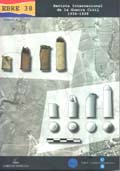Arqueología del fascismo en Etiopía (1936-1941)
DOI:
https://doi.org/10.1344/ebre38.2010.4.17973Keywords:
Italian Fascism, Second World War, colonialism, archaeology of the contemporary pastAbstract
During the last decade, the archaeology of the twentieth century has proved to be an innovative and increasingly important field within the discipline. In particular, the archaeology of conflict has enjoyed a remarkable development. This kind of research understands conflict sensu lato: war, civil conflict, class struggle, genocide, revolutions, political repression, prisons, and colonialism are some of the topics studied by the subdiscipline. In this article, we intend to show the possibilities of the archaeology of contemporary conflict through the study of the Italian remains in the frontier between Sudan and Ethiopia (1936-1941) that we have had the opportunity to study in the framework of a project developed since 2001 by the Department of Prehistory of the Complutense University of Madrid.Downloads
How to Cite
González Ruibal, A., Fernández Martínez, V. M., Falquina Aparicio, Álvaro, Ayán Vila, X., & Rodríguez Paz, A. (2017). Arqueología del fascismo en Etiopía (1936-1941). Ebre 38, (4). https://doi.org/10.1344/ebre38.2010.4.17973
Issue
Section
Patrimoni, didàctica i recreació
License
The author retains the rights.
The author who publishes in this journal agrees with the following terms:
The author retains the rights of authorship and grants the journal the right of first publication of the work.
The texts will be disseminated with the Creative Commons Acknowledgment license, which allows the work to be shared, provided they recognize the authorship, the initial publication in this journal and the conditions of the license.






